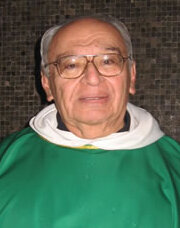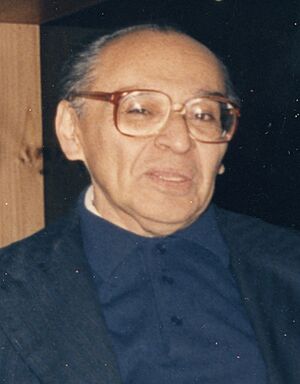Gustavo Gutiérrez facts for kids
Quick facts for kids
Gustavo Gutiérrez
|
|||||||||
|---|---|---|---|---|---|---|---|---|---|

Gutiérrez in 2007
|
|||||||||
| Born |
Gustavo Gutiérrez-Merino Díaz
8 June 1928 Lima, Peru
|
||||||||
| Died | 22 October 2024 (aged 96) Lima, Peru
|
||||||||
| Alma mater | Catholic University of Leuven, Catholic University of Lyon | ||||||||
| Occupation | Priest and professor | ||||||||
| Employer | University of Notre Dame | ||||||||
| Known for | Latin American liberation theology, preferential option for the poor | ||||||||
| Awards | Pacem in Terris Award, Príncipe de Asturias award, Legion of Honor, American Academy of Arts and Sciences | ||||||||
|
|||||||||
Gustavo Gutiérrez-Merino Díaz (8 June 1928 – 22 October 2024) was a Catholic priest and thinker from Peru. He is known as one of the main founders of liberation theology in Latin America. This idea focuses on helping the poor and fighting for fairness.
In 1971, he wrote a very important book called A Theology of Liberation. This book helped shape the ideas of liberation theology. Gutiérrez also taught theology at the University of Notre Dame in the United States and at other universities around the world.
Gutiérrez first studied medicine and literature. But then he decided to become a priest. He studied theology in Belgium and France. His main focus was connecting faith with helping those in need. He believed that God's love should be shown by improving the lives of poor people. He often spoke out against unfair social and economic systems that caused poverty. A key question for him was: "How do we show the poor that God loves them?"
Contents
Early Life and Studies
Gustavo Gutiérrez was born in Lima, Peru, on June 8, 1928. When he was a teenager, he had a bone disease called osteomyelitis. This meant he had to use a wheelchair for six years, from age 12 to 18. He said this time taught him a lot about hope and the importance of family and friends.
He first went to medical school to become a psychiatrist. During this time, he became involved with a Catholic group called Catholic Action. This group greatly influenced his later ideas about faith and justice.
While studying medicine, Gutiérrez realized he wanted to become a priest. He then studied theology in Belgium and France. There, he learned from many important thinkers. He was influenced by ideas about how the Church should be open to the modern world. In 1959, he became a priest.
What is Liberation Theology?
When Gutiérrez returned to Peru in the late 1950s, he saw a lot of poverty. He said that over 60% of people in his continent lived in poverty. He wanted to find a way for Christian faith to address this problem. He believed that loving your neighbor was the most important part of Christian life.
He felt that the theology he learned in Europe didn't fully understand the harsh conditions in Latin America. His church members in Lima taught him about hope even when suffering. This inspired him to write his book On Job later on.
In 1968, Gutiérrez shared his ideas at a meeting in Peru. He said that the problems in Latin America came from unfair social structures. He believed that God's glory is present in poor people. So, helping them meant honoring God. These ideas led to his famous book, A Theology of Liberation, published in 1971.
Liberation theology looks at poverty through the Bible. Gutiérrez talked about two kinds of poverty. One is a "scandalous state," meaning extreme need, which God dislikes. The other is "spiritual childhood," meaning a humble spirit, which God values. He believed that in Latin America, people were hungry for both food and God. He taught that showing strong faith helps God's plans come true for everyone, no matter their background.
Challenges and Teaching in the U.S.
In 1974, Gutiérrez started the Bartolomé de Las Casas Institute in Lima. This institute used theology to study social problems. It aimed to educate people and work with community groups.
Gutiérrez faced some criticism for his ideas. Later, he moved to the United States and joined the Dominican Order. He became a professor at the University of Notre Dame. He also taught at other well-known universities like Harvard and UC Berkeley. He retired from teaching at Notre Dame in 2018.
Helping the Poor
Gutiérrez believed it was important to truly understand what it means to be poor. He said poverty is not just about not having money. It's "a way of living, of thinking, of loving, of praying, of believing and waiting." He also stressed that poverty comes from unfair social systems.
He taught that Christians should have a "preferential option for the poor." This means putting the needs of the poor first. This idea leads to three main actions:
- Sharing God's message and showing how poverty is wrong.
- Understanding God better by looking at the world from the poor's point of view.
- Following Jesus' example, who spent his time with those who were ignored.
Gutiérrez believed that Jesus' life showed us how to help others. Jesus became human, died, and rose again to set us free. This freedom from Christ, he said, helps us gain both spiritual and economic freedom.
The idea of "liberating praxis" means putting faith into action. It's about how the Church can help people gain economic, spiritual, and intellectual freedom. This action comes from God's love for us and the idea that we should all be kind to each other. Gutiérrez worked with Paulo Freire, an educator, on these ideas.
His Passing and Impact
Gustavo Gutiérrez passed away from pneumonia in Lima on October 22, 2024, at age 96. Many people attended his funeral services in Lima. Pope Francis sent a video message, calling Gutiérrez "a man of the Church who knew how to be silent when he had to be silent, who knew how to suffer when it was his turn to suffer."
Gutiérrez was a very important person in 20th-century theology. His ideas about liberation theology encouraged Christians in Latin America to act on their commitment to the poor. His work helped bring attention to inequality in both religious and political discussions. His ideas have influenced many people and churches around the world.
Even though some of his ideas were questioned, the Church never officially stopped him from teaching. In 2018, on his 90th birthday, Pope Francis thanked him for his contributions to the Church and humanity.
Awards and Honors
Gustavo Gutiérrez received many awards for his work:
- In 1993, the French government gave him the Legion of Honor.
- In 2000, Brown University gave him an honorary Doctor of Divinity degree.
- In 2002, he was chosen for the American Academy of Arts and Sciences.
- In 2003, he received the Príncipe de Asturias award.
- In 2014, he won the Joseph B. and Toby Gittler Prize.
- In 2016, he received the Pacem in Terris Award.
Selected Works
- On the Side of the Poor: The Theology of Liberation. Co-authored with Cardinal Gerhard Ludwig Müller. Orbis Books, 2015: ISBN: 978-1626981157
- In the Company of the Poor: conversations between Dr. Paul Farmer and Fr. Gustavo Gutiérrez. Ed. Michael Griffin and Jennie Weiss Block. Orbis Books, 2013: ISBN: 978-1626980501
- Las Casas: In Search of the Poor of Jesus Christ, trans. Robert R. Barr (Maryknoll: Orbis, 1993).
- The God of Life, trans. Matthew J. O'Connell (Maryknoll: Orbis, 1991).
- On Job: God-Talk and the Suffering of the Innocent, trans. Matthew J. O'Connell (Maryknoll: Orbis, 1987).
- The Truth Shall Make You Free: Confrontations, trans. Matthew J. O'Connell (Maryknoll: Orbis, 1990).
- We Drink from Our Own Wells: The Spiritual Journey of a People, 20th anniversary ed., trans. Matthew J. O'Connell (Maryknoll: Orbis, 2003; 1st ed., Maryknoll: Orbis, 1984).
- A Theology of Liberation: History, Politics, and Salvation, 15th anniversary ed., trans. Caridad Inda and John Eagleson (Maryknoll: Orbis, 1988; 1st ed., Maryknoll: Orbis, 1973).
See also
 In Spanish: Gustavo Gutiérrez (teólogo) para niños
In Spanish: Gustavo Gutiérrez (teólogo) para niños
- Liberation theology
- Social justice
- Progressive Christianity
 | DeHart Hubbard |
 | Wilma Rudolph |
 | Jesse Owens |
 | Jackie Joyner-Kersee |
 | Major Taylor |


